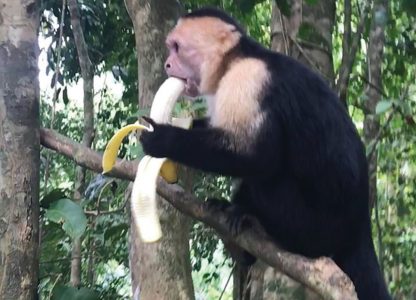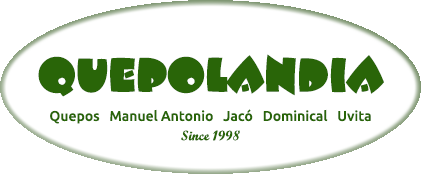Please do not feed or interact with the wildlife…it is the law!
 Did you know that Costa Rica has a great wealth of nature, with about 5% of the species worldwide concentrated in our small country? We have over 8,500 species of plants, 220 species of reptiles, 160 species of amphibians, 205 species of mammals, and 850 species birds. However, deforestation, poaching, the use of pesticides, illegal pet trade, and improper feeding have caused a decline in populations of many species to levels that threaten their survival.
Did you know that Costa Rica has a great wealth of nature, with about 5% of the species worldwide concentrated in our small country? We have over 8,500 species of plants, 220 species of reptiles, 160 species of amphibians, 205 species of mammals, and 850 species birds. However, deforestation, poaching, the use of pesticides, illegal pet trade, and improper feeding have caused a decline in populations of many species to levels that threaten their survival.
You might find feeding and interacting with the wild animals to be a thrilling experience, but you are not doing the them a favor. In fact, you are actually harming them, and it is against the law (Conservation of Wildlife Act No. 7317 according to Decree No. 32633- MINAE). The only exception is a dire emergency where a species would perish without aid or food.
Here’s why you should not feed our wildlife:
- Wildlife are highly susceptible to diseases from human hands. They can die from bacteria transferred off your hand that has no ill effect on you. They can pass diseases to you as well.
- Migration to human-populated areas to be fed increases the risk of dog attacks, road accidents, and electrocution.
- Irregular feeding leads to an aggressive behavior toward humans and other species and creates a dangerous dependency on humans that diminishes the wildlife survival abilities.
- Contrary to the stereotype, bananas are not the preferred food of monkeys in the wild, nor other wildlife in the area. Tropical fruits, seeds, eggs, and insects found in the wild are what nature intended. Bananas, especially those containing pesticides, can upset their delicate digestive systems and cause serious dental problems that can lead to eventual death.
- Pregnant females who are fed nothing but bananas during their pregnancy will not give birth to healthy infants. The babies will be malnourished, or even die before birth.
- Feeding interferes with their natural habits and upsets the balance of their lifestyle.
- Contact with humans facilitates poaching and the trade in illegal wildlife.
- Wildlife needs to travel long distances each day to be in good physical condition. If they know that food is available in a particular location, they will not leave that area.
 In addition, pursuing or getting close to animals for pictures or touching is very stressful to the animal. Sloths may look like they are always smiling, but close human contact causes them to become agitated, so keep your distance!
In addition, pursuing or getting close to animals for pictures or touching is very stressful to the animal. Sloths may look like they are always smiling, but close human contact causes them to become agitated, so keep your distance!
The wildlife does not realize any of this. Now YOU do, so you are no longer naïve to the harm caused by feeding and interaction. Don’t facilitate the extinction of nature’s most amazing creatures for your own pleasure or financial gain.
For questions or to report violations, please email Kids Saving the Rainforest: jennifer@kstr.org .
